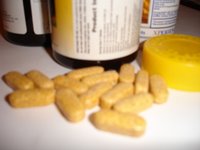 This important story about a drug trial that went wrong in London has almost been buried by the alarm over a single case of H5N1 in a swan in Scotland. In the middle of last month, six people were taken seriously ill--with multiple organ failure--after taking part in a small clinical trial of an antibody treatment called TGN1412.
This important story about a drug trial that went wrong in London has almost been buried by the alarm over a single case of H5N1 in a swan in Scotland. In the middle of last month, six people were taken seriously ill--with multiple organ failure--after taking part in a small clinical trial of an antibody treatment called TGN1412.The mishap was so serious that Britain's Medicines and Healthcare products Regulatory Agency (MHRA), a government body, swiftly launched a full inquiry. On Wednesday of this week it announced interim findings. The trial had been run correctly, doses were given as they were supposed to, and there was no mistake in manufacturing. In other words, there was something unexpected about the drug itself, despite testing on animals and human-cell cultures, and despite the fact the doses given to humans were only 1/500th of what had been given to animals.
This is a difficult result for the drug business because it raises questions about the right way of testing medicines of this kind. TGN1412 is unusual in that it is an antibody. And it is an unusual antibody as well. Unlike all other antibody drugs it is what is called a “superagonistic” antibody, designed to increase the numbers of a type of immune cell known as regulatory T-cells.
Reduced numbers, or impaired function, of regulatory T-cells has been implicated in a number of illnesses, such as type 1 diabetes, multiple sclerosis and rheumatoid arthritis. Boosting the pool of these antibodies seemed like a good treatment strategy. Unfortunately, that strategy fell disastrously to pieces and it will take a little longer to find out why.The result highlights concerns raised in a paper just published by the Academy of Medical Sciences, a group of experts based in London. It says there are special risks associated with novel antibody therapies. For example, their chemical specificity means that they might not bind to their targets in humans as they do in other species.
The MHRA has decided that a working group of experts is now needed to decide how trials of this sort of drug can be handled more safely. Its main concern is how to test protein molecules that have novel modes of action--particularly in the immune system. While this expert group is working (it could take around three months) the MHRA will authorise further trials of compounds of this kind only after taking advice.
Tales of the unexpectedApr 6th 2006
Why a drug trial went so badly wrong
IN ANY sort of test, not least a drugs trial, one should expect the unexpected. Even so, on March 13th, six volunteers taking part in a small clinical trial of a treatment known as TGN1412 got far more than they bargained for. All ended up seriously ill, with multiple organ failure, soon after being injected with the drug at a special testing unit at Northwick Park Hospital in London, run by a company called Parexel. One man remains ill in hospital.
(more.. subscription required)
No comments:
Post a Comment